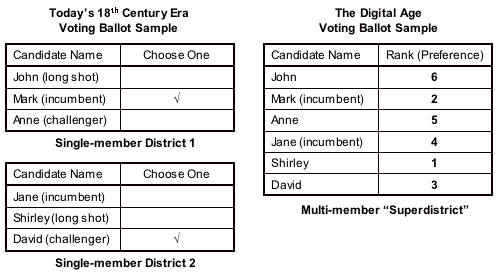|
|
 |
|
.

Why shouldn't you be able to pool votes with your friends over the Internet?
This simple example shows why it is currently impossible to pool votes with
your friends over the Internet. Suppose you and a friend live in nearby congressional districts and favor candidate Shirley,
a long shot. Under today's rules (left) you and your friend have a problem. (1) Your friend can't vote for Shirley because
your friend doesn't live in your district. (2) You may think twice about voting for her because you would be "throwing away
your vote" on the race between the incumbent and the challenger. Under more fair voting rules (right), you and your friend
can both vote on the same candidate pool. You rank the candidates you want in order of preference. Now you need not worry
about throwing away your vote because ranking prevents this. You simply vote for whom you prefer. If Shirley can get enough
votes to win, great. If Shirley doesn't win, the choice ranking simply moves on to your next choices so that you can still
participate in the selection of the remaining candidates. Under the current system of single-member districts, long shots
rarely have a chance because they are always seen as "spoiler" candidates. By pooling congressional districts into multi-member
"superdistricts," long-shot candidates who have a following can become mainstream candidates and can win fairly. To win the
candidate needs enough votes to be proportional to one seat in the Congress. For these reasons it is impossible to use the
Internet to aggregate votes across district lines for first-choice candidates. It's hard to interpret such a structural
impediment as anything other than a denial of personal choice and freedom.

|
 |
|
|
|
|
|
 |

